- Home
- Lou Cameron
On Dead Man's Range Page 3
On Dead Man's Range Read online
Page 3
He chuckled and said, “Holbrook sure is a friendly little old town. I’ll study the vermin at the Majestic later. First I got to look up old Commodore Perry Owens.”
She asked, “Oh, do you know the poor old dear?”
He replied, “Not yet. Do you?”
She nodded and said, “Ever since I was a schoolgirl. We might not have had a school if it hadn’t been for that gruff old huggy bear.”
Stringer said, “I hear how Owens cleaned up the whole county. Is that why you worked for his last election try?”
She nodded. “We all did. All of us old timers who knew him, that is. It wasn’t fair for the Republicans to run a younger, perhaps more educated man against Sheriff Owens, for before he made them stop, the cowhands around here used to shoot Republicans on sight. Most of the riders for the Aztec Land and Cattle Company came west with the railroad from Texas, you see.”
He said, “I heard the Hash Knife brand was big and ferocious, and that Arizona country folk vote as solid a Democrat ticket as Texas always has. But I’d rather discuss the freak election with the man who lost it, no offense. So where can I find your old huggy bear these days?”
She sighed and said, “I don’t know. He took it awfully hard. They say that the morning after the final votes had been tallied, he stood tall in front of the courthouse, threw his tin star down in the street, and ground it into the dust with his boot heel. Then he got in his buckboard with his pretty young wife, Miss Elizabeth, and drove away, not looking back. They never went back to their spread here in Navajo County. Some say he was so bitter he just kept driving, forever.”
A hearty male voice behind Stringer asked, “Who drove where forever, Patty?” and Stringer turned to see a tall portly man of about fifty. He looked like a born politician to Stringer. But his smile seemed sincere and his handshake was as firm as they were introduced. Lawyer Addams made them follow him into his somewhat more imposing oak-paneled private office and tell him the whole story again. Stringer was getting mighty sick of it by the time they had Addams up to date, with Patty doing most of the talking. Her boss or senior partner, whichever, nodded thoughtfully at Stringer and said, “I’m sure I can get one of the few honest judges we have left to set you free without bail, on paper I mean. I’ll ask him for a peace bond and a formal permit for that gun of yours while I’m at it. Meanwhile, you’d best hole up at the Majestic until we can arm you properly for this infernal Republican town.”
Stringer asked thoughtfully, “How come I have to hide out at all? Nobody’s tried to arrest me so far.”
Lawyer Addams smiled knowingly and asked, “Who could blame our new town marshal, Nate Ryan, after you’d just beaten the former quick-draw champ of the county to the draw? But Nate’s just a chore boy to the powers that be, and we’ve agreed Blue Streak was sent to run you out of town by someone more important. The next gun slick who tries is likely to come at you with a badge as well as more backing. Let us back you with your own legal standing in this community, and the odds will be more even. Right now you’re just a stranger who sassed the town law after gunning a local citizen. Do you really need a diagram on the blackboard to see how they could make that read for the coroner’s jury later?”
Stringer smiled thinly and said, “I figured I’d be smarter coining to a lawyer who’s no longer in with the courthouse gang. What kind of a retainer did you have in mind?”
Lawyer Addams shrugged and said, “I know where you work, should you skip out on your final fee. I frankly can’t say, this early, how much money we’ll be talking about by the time this is over. So far we haven’t done more than twenty dollars worth of anything for you. It’s only fair to warn you that we could be talking three or even four figures by the time you’re free to leave town, though.”
Stringer grimaced and said, “Had I known old Sheriff Owens had already done so, I might have taken that fool’s advice about the next train out. I don’t see how I’ll ever dig up enough of a story to even pay for the trip, with the star attraction pouting somewhere off stage.”
Addams nodded understanding and said, “I may be able to give you a few names, dates, and places later, when we’ve more time to chat. Owens and me go back a ways. I even rode with him on posse a time or two, when the world and us were younger and wilder. But right now you’d best get over to that hotel and stay out of sight until I can get to a judge who recalls the old days as fondly.”
Stringer agreed. But as he was leaving he turned in the doorway to say, “Miss Patty, here, told me Owens and his wife drove off forever, leaving their property here to whom? It seems to me that even a bitter man would want something for his property.”
Addams nodded and said, “He did. I handled the sale for them. Before you ask, no, I don’t have their present address. I wired the money to a hotel in Globe. The next time I tried to get in touch with my old pal, they’d checked out of the hotel and left no forwarding address. They might be ranching down that way, or even farming some of that new irrigated cropland along the Gila. I know he hasn’t pinned on another badge. Not in this territory, at any rate. I asked.”
Stringer asked, “How come? Was it that important?”
Addams said, “Not really, but I try to do right by my clients or former clients. Mrs. Owens, the former Elizabeth Barrett, had credit coming to her at the dry goods store. Old Pear, that’s what his pals were allowed to call him, had given them a couple of hundred dollars for his wife to charge against. She hadn’t charged near that much when they left town so suddenly. So, as they knew I handled some business for them, the store owners gave me the unspent money to give back to them. I tried. But as I said, they’d just dropped out of sight. I imagine Pear thought his wife had spent most of it on female notions, and she—being a woman—didn’t understand she had anything coming back to her.” Then he noticed the dirty look he was getting from Patty Stern and quickly added, “It was Patty, here, who came up with the grand suggestion we bank the money for them in escrow so’s it can be earning interest while we figure out where in thunder they might be these days.”
All three of them grinned knowingly. Then the blonde walked Stringer to the hallway, told him she’d get his papers to him by sundown at the latest, and warned him, “Take Lawyer Addams serious, no matter how fat and jolly he looks. He’s practiced law here in Navajo County since they were calling it part of Apache County, and it’s true he’s ridden all over it on posse as well as business. So he knows the way things work in this rustic corner of the territory, and if he says you ought to watch yourself, you’d just better watch yourself, hear?”
He said he’d already figured Addams for a sly as well as tail-wagging old dog, and they parted friendly.
CHAPTER
THREE
*
It was now mid-afternoon, but not as hot, for the sun had been ambushed by some unseasonable summer clouds—thunderheads, from the way they growled as well as looked. He was glad he had the rain slicker in his gladstone as he trudged toward the railroad tracks with it in his left hand. He spotted the water tower before he spotted anything that looked like a Majestic Hotel, and when he did see the once-gilt letters across the false front, he had to laugh. For while the frame structure was two stories high, sort of, it was too rinky-dink to qualify as noble, and to hell with Her Majesty.
Once inside, though, he was pleasantly surprised by the smell of the small dark lobby. Someone had used a lot of lemon oil on the woodwork, and there was a big cut-glass bowl of fresh-cut red roses on the check-in counter, stinking pretty as anything.
The severely handsome woman behind the counter didn’t seem to admire him half as much, though. He figured her for about forty, depending on how life had treated her. Her dark brown hair was bunned up so tight atop her skull he figured it had to be smoothing at least a few wrinkles from her priss-lipped face. She’d have still been sort of pretty if the hotel business hadn’t no doubt given her just cause to regard guests dressed as cowboys with considerable dismay.
He sa
id, “I know I’m not wearing a proper tie, and I agree this gladstone don’t look loaded with treasure, ma’am. So before you tell me all your rooms are chock full of less uncouth gents, I’d best show you my credentials and lay some money on you in advance.”
Her expression didn’t change until she’d had time to admire his press pass and a portrait Andrew Jackson. Then her face got almost human as she asked, “How long will you be staying with us, Mr. MacKail? I notice you spell that M-A-C, rather than M-C.”
He said, “I’m not sure how long I’ll have to stay here in Holbrook, ma’am. You just tell me when I’ve used up that twenty and I’ll give you some more. My name’s always been spelled that way because that’s the way it was spelled in the old country, which was Lochaber, County Inverness.”
She actually managed a frosty smile as she took down his key and said, “I’ll show you to your room, then. My name is MacLean, Margaret MacLean, County Argyll, by the way.”
That didn’t surprise Stringer. Nobody else ever seemed to worry about whether it was Mac or Mc. She was a long way from a wee lassie as he followed her up the narrow stairs to the top floor. But she sure hour-glassed nicely under that starched white blouse and chocolate brown skirt that buttoned down the side in the new and somewhat shocking fashion, even if you couldn’t see anything.
She led him into a small but clean room with a mighty slanting ceiling. He’d noticed out front that the building was only built square in front. He’d given up trying to figure out false fronts. They never fooled anyone, and had to be more expensive than honest carpentry. He put down his gladstone and said the quarters suited him just fine.
She said, “Well, I’d best get downstairs and wait for the 2:47. I know nobody ever gets off that train, but you never know.”
He nodded and said he could see a lady in the hotel business would have to be up on her railroad timetables. She smiled sort of wistfully and said, “That’s not where I learned about railroad matters. I used to be a Harvey Girl. But what am I saying? You can’t be old enough to remember the Harvey Girls.”
He suspected she was hoping that wasn’t true. So he said, “Sure I remember the Harvey Girls along the Santa Fe, Miss Margaret. They served coffee and grub all along the right of way until the Pullman dining cars got invented.” Then, as he counted in his head and saw how the years added up, he gallantly added, “I hope you won’t get sore. But if you was ever a Harvey Girl, you sure must have signed on for the last season, younger than they should have hired you. For you look more like a Gibson Girl than any Harvey Girl.”
She looked flustered and told him he was just an old fibber, adding, “My friends call me Madge. I kill when I hear Maggie. I have to go now. Make yourself at home, and don’t you go flattering my wallpaper, even if you are a Lochaber man!”
He didn’t see fit to argue that he considered himself a Mother Lode rider, to the extent he worried about such notions. When she left, he proceeded to get comfortable, and found himself wondering why some folk worried so about their old countries. Perhaps, having grown up on a spread where all the neighbors had been either Scotch or Mexican, and knowing he was Americano, he’d just naturally assumed that all Americans were his kind of folk. He hadn’t really noticed, until he’d gone off to Cuba with the Rough Riders as a young and green war correspondent, how many odd kinds of white folk and even colored folk called themselves Americans.
When he got down to his socks, jeans, and undershirt, Stringer sat on the narrow but comfortable brass-bound bed to roll a smoke and try to get back to serious matters. He didn’t care what kind of a name Owens was, even if it did sound Welsh. He hadn’t come all this way to study the old sheriff’s family tree. The story, if there was a story, lay in how he’d been crooked out of office—and just as important, why?
It was a pure fact of nature that most cowtowns tended to be run by Republicans, as merchants and bankers tended to be, and that just the same, most such communities were content with a Democrat county sheriff to police the surrounding countryside, which was almost always solid Democrat country, here in the southwest. Both parties knew that made good sense. The notorious gun fight at the OK Corral, which had really taken place in a vacant lot across the street, until editors like Sam Barca had thought that less interesting, never would have happened had the voters of Tombstone not elected two separate and surly cliques of rival parties to police the infernal town at the same time.
That confusion had been settled back about the time this fool town was being born. They’d had the sense to put in a sheriff who spoke the same politics as the cowhands he stopped from shooting up the business establishments owned mostly by Damn-Yankee Republicans, Mormons, and other natural targets of the Texican yahoo. Owens had done a good job for a long time. So something about Navajo County had changed, a lot, if even the local Democrats had voted him out.
Stringer started to light his Bull Durham. A big fat crystal globe crashed down from the sky to the hitherto dry sill of the one open window and spattered all over him, snuffing his match.
He said, “Aw, hell,” and rose to close the window as it began to rain fire and salt outside. He was facing the water tower across the way as he did so. So he saw the dark figure atop it, training a rifle his way, and ducked just in time.
As Stringer hit the rug a big buffalo round—from the sound of it—smashed through one pane to shower him with powdered glass and let the rain come in even more. Stringer cursed, rolled to the chair he’d draped his gun rig over, and crawled back to the window to return the compliment.
He reached up to slide the window open again, braced for a mighty hard slap on the wrist. When nothing like that happened, he risked his head above the sill as far as his cheekbones, as one had to in order to find a target at times like these. But he saw no target now. It was even hard to make out the water tower, with the desert cloudburst waving silvery veils of downpour back and forth. When he did get a clear view, during a shift of the wind, he saw nobody up there.
The door opened behind him. Stringer almost shot poor old Madge before he saw who’d circled behind him. He snapped, “Get down, damn it!” and when, instead, she came closer, demanding to know what on earth he was doing to her very own property, he kicked her ankles out from under her with a fortunately bootless foot.
She sure yelled a lot, for a gal who couldn’t be that hurt, as she landed almost on top of him. Her head was still above the level of the windowsill. He grabbed her hair bun with his free hand and shoved her face to the floor as she proceeded to beat her rug with her fists and yell rape, murder, or both.
He shook her to shut her up and hissed, “I ain’t out to rape you, no offense. We’re under fire from that tower across the way. Or we was, until just recent. Lay still while I figure out who may or may not be shooting at us.”
She propped herself up on one elbow, staring about in wonder at the glass and raindrops on her rug as she moaned, “Oh, Lord, my grandmother often warned us about Lochaber men. You haven’t been under my roof a full hour and you’ve wrecked the place!”
He smiled reassuringly at her. It was easier to smile at her now that her soft brown hair was hanging down like that and she’d somehow lost the two top buttons of her blouse. He said, “I never done it. But I’ll clean it up and even pay for a new pane. Our more important chore at the moment is to stay alive long enough to worry about housekeeping chores. Did anyone come in off that last train?”
She said, “No. We’re all alone here. There are no other guests. But surely help is on the way by now, if you heard gun shots.”
He said, “I heard one. Did you?”
She gave a little moan and answered, “No. Not that I noticed above that storm outside and— Oh, Stuart, what will we ever do to save ourselves?”
He said, “Nothing. We don’t have to do anything, whether he’s gone or taking one hell of a shower bath right now. He missed his one good chance as I was sitting near an open window like a fool. I’m a lot harder to hit once I know someone’s shoo
ting at me. He likely knows that, too, by now. His best chance to get away will be during this gully washer, with nobody else out of doors.”
She asked, “What if they decide that makes this a good time to move in on us… and who on earth are they?”
He said, “If I knew the answer to either of your questions, I’d know what’s going on. They’re not after us. I told you they were shooting at me. They wouldn’t have even known which window to shoot at if I hadn’t been too addled by the heat to think straight after I’d been told someone wanted me out of town or dead.”
She glanced up through the wet glass and said, “Well, it’s going to cool off a lot before we see the sun again. The wind is from the east, and in these parts that means the thunderbird is serious. By the time this storm lets up it may be too late for anyone decent to be out and about. The streets of Holbrook are mighty quiet after dark when the herd’s not in town.”
As if to show how noisy the streets of Holbrook could get, a thunderbolt sizzled down, close enough to shake the whole hotel, and she clutched at him to bury her face against his undershirt, gasping, “Oh, Stuart, I’m so scared! Do something!”
He patted her back to comfort her, saying, “Steady, now. I don’t think anyone yellow enough to snipe from such uncertain range is likely to move in on an armed enemy, on the alert and forted up. But it might be a good notion to be fort up better. They have this room figured. Are the doors downstairs locked?”
She said, “My back door’s bolted good. I don’t cotton to tramps stealing grub from my kitchen pantry while I’m minding the front. The door you came in by is shut, I hope, but of course it’s not locked. I have enough trouble getting anyone to stay here as it is.”
He said, “Bueno. Here’s what we’ll do. First we check out of this room and into one that covers the stairwell better. Then I’ll go down and bar the front door. Coming in, front or back, they’ll have to make some noise, and should they be dumb enough to come at us up that narrow stairway, it’ll be my turn to make some noise, see?”

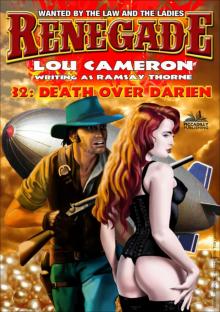 Renegade 32
Renegade 32 Renegade 31
Renegade 31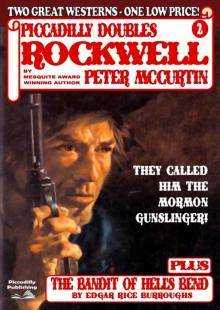 Piccadilly Doubles 2
Piccadilly Doubles 2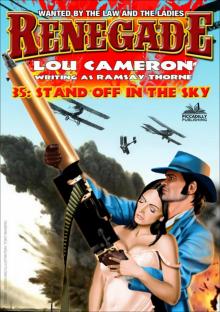 Renegade 35
Renegade 35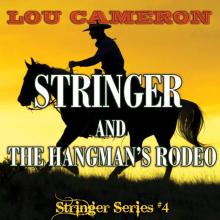 Stringer and the Hangman's Rodeo
Stringer and the Hangman's Rodeo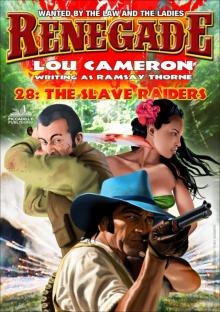 Renegade 28
Renegade 28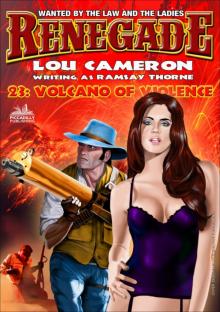 Renegade 23
Renegade 23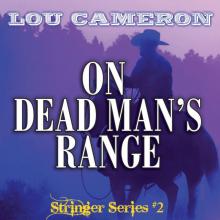 On Dead Man's Range
On Dead Man's Range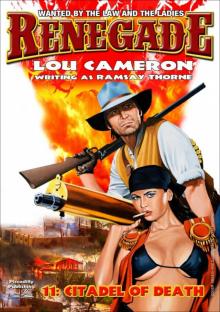 Citadel of Death (A Captain Gringo Western Book 11)
Citadel of Death (A Captain Gringo Western Book 11)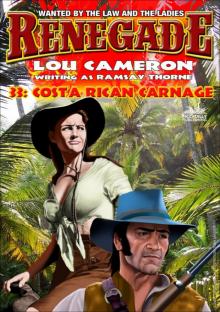 Renegade 33
Renegade 33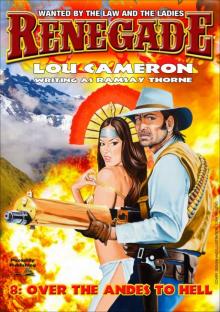 Over the Andes to Hell (A Captain Gringo Western Book 8)
Over the Andes to Hell (A Captain Gringo Western Book 8) Renegade 30
Renegade 30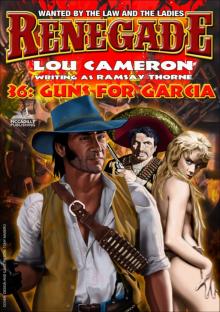 Renegade 36
Renegade 36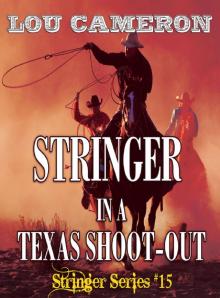 Stringer in a Texas Shoot-Out
Stringer in a Texas Shoot-Out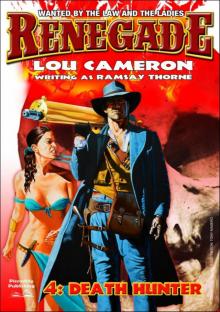 The Death Hunter
The Death Hunter Stringer and the Wild Bunch
Stringer and the Wild Bunch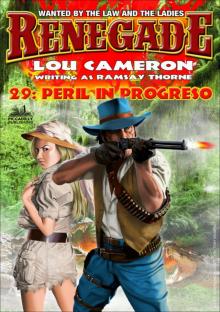 Renegade 29
Renegade 29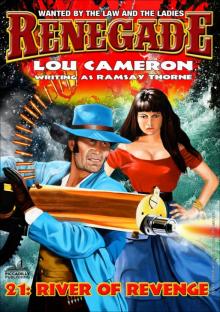 Renegade 21
Renegade 21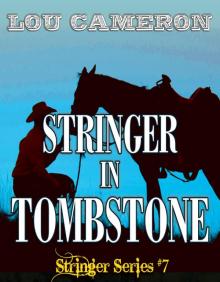 Stringer in Tombstone
Stringer in Tombstone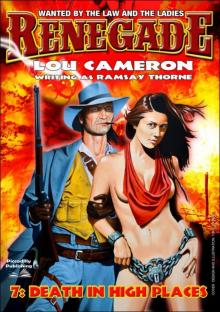 Death in High Places (A Renegade Western Book 7)
Death in High Places (A Renegade Western Book 7)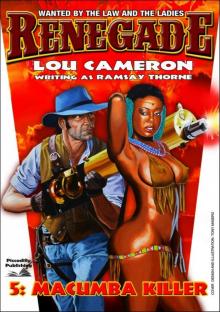 Macumba Killer
Macumba Killer Renegade 17
Renegade 17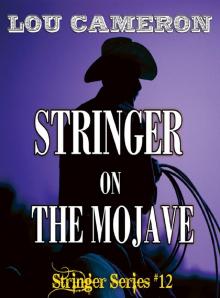 Stringer on the Mojave
Stringer on the Mojave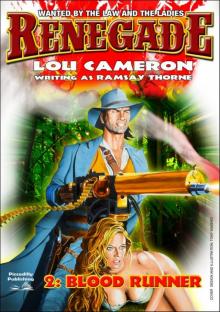 Blood Runner
Blood Runner Renegade 22
Renegade 22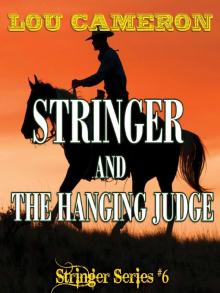 Stringer and the Hanging Judge
Stringer and the Hanging Judge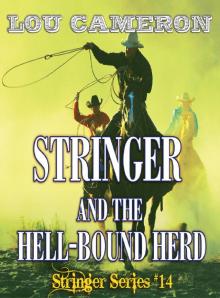 Stringer and the Hell-Bound Herd
Stringer and the Hell-Bound Herd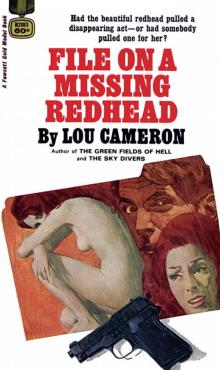 File on a Missing Redhead
File on a Missing Redhead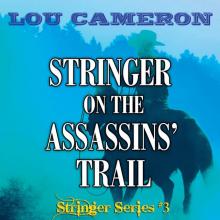 Stringer on the Assassins' Trail
Stringer on the Assassins' Trail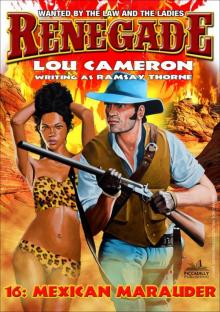 Mexican Marauder (A Captain Gringo Adventure #16)
Mexican Marauder (A Captain Gringo Adventure #16)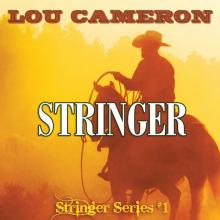 Stringer
Stringer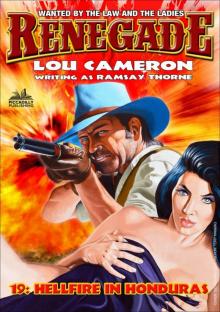 Renegade 19
Renegade 19 Stringer and the Oil Well Indians
Stringer and the Oil Well Indians Stringer and the Lost Tribe
Stringer and the Lost Tribe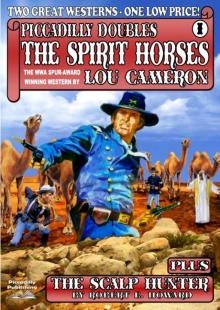 Piccadilly Doubles 1
Piccadilly Doubles 1 Stringer and the Border War
Stringer and the Border War Renegade
Renegade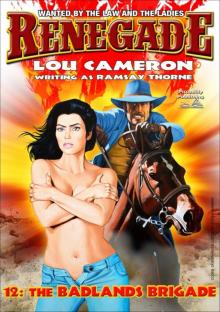 The Badlands Brigade (A Captain Gringo Adventure Book 12)
The Badlands Brigade (A Captain Gringo Adventure Book 12) Stringer and the Deadly Flood
Stringer and the Deadly Flood Renegade 25
Renegade 25 The Great Game (A Captain Gringo Western Book 10)
The Great Game (A Captain Gringo Western Book 10)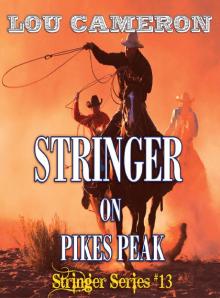 Stringer on Pikes Peak
Stringer on Pikes Peak